- Home
- Mario Puzo
The Fourth K Page 20
The Fourth K Read online
Page 20
Janet Wyngale, what a great name. She was leaning over his shoulder to point out things on the computer sheets. He was conscious she had switched her feet so that she was standing more beside him than behind him. Her golden hair brushed his cheek, silky, warm and smelling of crushed flowers.
“Your perfume is great,” Sal Troyca said, and he was almost shivering when the heat of her body gusted over him. She didn’t move or say anything. But her hair was like a Geiger counter over his cheek picking up the radiating lust in his body. It was a friendly lust, two buddies in a jam together. They would be going over computer sheets all through the night, answering a witch’s brew of telephone calls, calling emergency meetings. They would fight side by side.
Holding the computer sheets in his left hand, Troyca let his right hand touch the back of her thigh under her skirt. She didn’t move. They were both staring intently at the computer sheets. He let his hand stay perfectly still, let it burn on satiny skin that electrified his scrotum. He was not conscious that the computer sheets had fallen to the desk. Her flowered hair drowned his face and he swiveled and both his hands were under her skirt, both his hands like little feet running over that field so satiny under the nylon of her panties. Underneath to the pubic hair and the wet agonizing sweetness of the flesh beneath. Troyca levitated from his seat, it seemed to him he was motionless in the air, his body forming a supernatural eagle’s nest into which Janet Wyngale, with a fluttering of wings, came to rest on his lap. Miraculously she was sitting right on his cock, which had mysteriously emerged and they were face-to-face kissing; he drowning in crushed flowers, groaning with passion, and Janet Wyngale kept repeating a passionate endearment, which he finally understood. “Lock the door,” she was saying, and Troyca freed his wet left hand and flipped the electronic button that enclosed them in that perfect brief moment of ecstasy. Both tumbled to the floor in a graceful dive and she had her long legs wrapped around his neck, and he could see the long milk-white thighs and they climaxed together in perfect unison, Troyca whispering ecstatically, “Ah, heaven, heaven.”
Then miraculously they were both standing, rosy-cheeked, their eyes flashing with delight, renewed, jubilant, ready to face the grueling long hours of work together. Gallantly Troyca passed her the gin and tonic with its joyful tinkling of ice cubes. Graciously and thankfully she wet her parched mouth. Sincerely and gratefully Troyca said, “That was wonderful.” Lovingly she patted his neck and kissed him—“It was great.”
Moments later they were back at the desk studying the computer sheets in earnest, concentrating on the language and the figures. Janet was a wonderful editor. Sal felt an enormous gratitude, and murmured with genuine courtesy, “Janet, I’m really crazy about you. As soon as this crisis is over we got to have a date, OK?”
“Umm,” Janet said. She gave him a warm smile. A friendly smile. “I love working with you,” she said.
CHAPTER
12
Television never had such a glorious week. On Sunday the assassination of the Pope had been repeated scores of times on the networks, on the cable channels, on PBS special reports. On Tuesday the murder of Theresa Kennedy had been even more continuously repeated, her murder floated through the airways of the universe endlessly and endlessly.
The face of Yabril, hawklike in the desert, hovering over the hostages, flew through every home in America. He became the mythical monster goblin on the late evening news, an ever-recurring nightmare to haunt the dreams of America. Messages of sympathy by the millions poured into the White House. In all of the great cities the citizens of America appeared on the streets wearing black arm bands. And so when the television stations climaxed late Wednesday with the leaked news of President Francis Kennedy’s ultimatum to the Sultan of Sherhaben, great mobs congregated all through the United States in a wild frenzy of jubilation. There was no question they supported the President’s decision. Indeed the TV correspondents who interviewed citizens on the street were appalled at the ferocity of the comments. The common cry was “Nuke the bastards.” Finally orders came from the top TV network news chiefs to stop covering the street scenes and to halt the interviews. The orders originated from Lawrence Salentine, who had formed a council with the other owners of the media.
In the White House President Francis Kennedy didn’t have time to grieve for his daughter. He was on the hot line to other heads of state to reassure them there was to be no territorial grabbing in the Middle East and to plead for cooperation and make them understand his own stance was irrevocable: that the President of the United States was not bluffing, that the city of Dak would be destroyed, and that if the ultimatum was not obeyed the Sultanate of Sherhaben too would be destroyed.
Arthur Wix and Bert Audick, together with Ambassador Waleeb, were already on their way to Sherhaben in a fast jet passenger plane not yet available to the civilian aircraft industry. Oddblood Gray was frantically trying to rally Congress behind the President and by the end of the day knew he had failed. Eugene Dazzy calmly dealt with all the memoranda from Cabinet members and the Defense establishment, his Walkman firmly set over his ears to discourage unnecessary conversation from his staff. Christian Klee was appearing and disappearing on mysterious errands.
Senator Thomas Lambertino and Congressman Alfred Jintz held constant meetings through Wednesday with colleagues in the House and Senate on the action to impeach Kennedy. The Socrates Club called in all their markers. True, it had to be admitted that the interpretation of the Constitution was a little murky in the assertion that Congress could designate itself as the deciding body, but the situation warranted such a drastic action—Kennedy’s ultimatum to Sherhaben was so obviously based on personal emotions and not on reasons of state.
By late Wednesday the coalition was set. Both houses, with barely two thirds of the vote assured, would convene on Thursday night, just hours before Kennedy’s deadline to destroy the city of Dak.
Lambertino and Jintz kept Oddblood Gray fully informed, hoping he could persuade Francis Kennedy to rescind his ultimatum to Sherhaben. Oddblood Gray told them that the President would not do so. He then briefed Francis Kennedy.
Francis Kennedy said, “Otto, I think you and Chris and Dazzy should have a late dinner with me tonight. Make it about eleven. And don’t plan to get home right away.”
The President and his staff dined in the Yellow Room, which was Kennedy’s favorite, though this made for a lot of extra work for the kitchen and waiters. As usual the meal was very simple for Kennedy, a small grilled steak, a dish of thinly sliced tomatoes and then coffee with a variety of cream and fruit tarts. Christian and the others were offered the option of fish. None of them ate more than a few bites.
Kennedy seemed to be perfectly at ease, the others were awkward. They all wore black arm bands on their sleeves, as did Kennedy. Everyone in the White House, including the servants, wore identical black bands, which seemed archaic to Christian. He knew that Eugene Dazzy had sent out the memorandum ordering this to be done.
“Christian,” Kennedy said, “I think it’s time we share our problem. But it goes no further. No memorandum.”
“It’s serious,” Christian said. And he outlined what had happened in the atom bomb scare. He informed them that on the advice of their lawyer the two young men had refused to talk.
Oddblood Gray said incredulously, “There’s a nuclear device planted in New York City? I don’t believe it. All this shit can’t be happening at once.”
Dazzy said, “Are you sure they really did plant a nuclear device?”
Christian said, “I think there is only a ten percent chance.” He believed that there was more than a ninety percent chance but he was not willing to tell them that.
“What are you going to do about it?” Dazzy said.
“We’ve got the nuclear search teams out,” Christian said. “But there’s a time element.” He spoke directly to Kennedy. “I still need your signature to activate the medical interrogation team for the PVT test.” He explained Section
IX of the Atomic Weapons Control Act.
“No,” Francis Kennedy said.
They were all astonished by the President’s refusal.
“We can’t take a chance,” Dazzy said. “Sign the order.”
Kennedy smiled and said, “The invading of an individual’s brain by government officials is a dangerous action.” He paused for a moment and said, “We can’t sacrifice a citizen’s individual rights just on suspicion. Especially such potentially valuable citizens as those two young men. Chris, when you have more confirmation, ask again.” Then Kennedy said to Oddblood Gray, “Otto, brief Christian and Dazzy on the Congress.”
Gray said, “Here is their game plan. They know now that the Vice President will not sign the declaration to impeach you under the Twenty-fifth Amendment. But enough of the Cabinet members have signed so that they can still take action. They will designate Congress as the other body to determine your fitness. They will convene late Thursday and then vote to impeach. Just to cancel you from the negotiations for the release of the hostages. Their argument is that you are under too much stress because of the death of your daughter.
“When you’re removed, the Secretary of Defense will countermand your orders to bomb Dak. They are counting on Bert Audick to convince the Sultan to release the hostages during that thirty-day period. The Sultan will almost certainly comply.”
Kennedy turned to Dazzy. “Put out a directive. No member of this government will contact Sherhaben. Doing so will be regarded as treason.”
Dazzy said softly, “With most of your Cabinet against you, there is no possibility your orders will be carried out. At this moment you have no power.”
Kennedy turned to Christian Klee. “Chris,” he said, “they need a two-thirds vote to remove me from office, right?”
“Yes,” Christian said. “But without the Vice President’s signature, it’s basically illegal.”
Kennedy looked into his eyes. “Isn’t there anything you can do?”
In that moment Christian Klee’s mind made another leap. Francis thought he could do something, but what was it? Christian said tentatively, “We can call on the Supreme Court and say that the Congress is acting against the Constitution. The language is vague in the Twenty-fifth Amendment. Or we can argue that Congress is acting contrary to the spirit of the amendment by substituting itself as the instigating party after the Vice President has refused to sign. I can contact the Court so they can rule right after the Congress votes.”
He saw the look of disappointment in Kennedy’s eyes and he racked his brain furiously. He was missing something.
Oddblood Gray said worriedly, “The Congress is going to attack your mental capacity. They keep bringing up the week you disappeared. Just before your inauguration.”
Kennedy said, “That’s nobody’s business.”
Christian became aware that the others were waiting for him to speak. They knew he had been with the President that mysterious week. He said, “What happened in that week won’t damage us.”
Francis Kennedy said, “Euge, prepare the papers for firing the whole Cabinet except for Theodore Tappey. Prepare them as soon as possible and I’ll sign right away. Have the press secretary give it to the media before Congress meets.”
Eugene Dazzy made notes, then asked, “What about the chairman of the Joint Chiefs of Staff? Fire him too?”
“No,” Francis Kennedy said. “Basically he’s with us, the others ruled against him. Congress couldn’t do this if it weren’t for those bastards in the Socrates Club.”
Christian said, “I’ve been handling the interrogation of the two young kids. They choose to remain silent. And if their lawyer has it his way, they will be released on bail tomorrow.”
Dazzy said sharply, “There’s a section in the Atomic Security Act that enables you to hold them. It suspends the right of habeas corpus, civil liberties. You must know that, Christian.”
“Number one,” Christian said, “what’s the point of holding them if Francis refuses to sign the medical interrogation order? Their lawyer applies for bail, and if we refuse them we still must have the President’s signature to suspend habeas corpus in this case. Francis, are you willing to sign an order for a suspension of habeas corpus?”
Kennedy smiled at him. “No, Congress will use that against me.”
Christian was confident now. Still, for a moment, he felt a little sick and bile rose in his mouth. Then it passed and he knew what Kennedy wanted, he knew what he had to do.
Kennedy sipped his coffee; they had finished their meal, but none of them had taken more than a few bites. Kennedy said, “Let’s discuss the real crisis. Am I still going to be President in forty-eight hours?”
Oddblood Gray said, “Rescind the order to bomb Dak, turn over the negotiations to a special team, and no action to remove you will be taken by the Congress.”
“Who gave you that deal?” Kennedy asked.
“Senator Lambertino and Congressman Jintz,” Otto Gray said. “Lambertino is a genuine good guy and Jintz is responsible in a political affair like this. They wouldn’t double-cross us.”
“OK, that’s another option,” Kennedy said. “That and going to the Supreme Court. What else?”
Dazzy said, “Go on TV tomorrow before Congress convenes and appeal to the nation. The people will be for you, and that may give Congress pause.”
“OK,” Kennedy said. “Euge, clear it with the TV people for me to go on over all the networks. Just fifteen minutes is what we need.”
Dazzy said softly, “Francis, it’s an awful big step we’re taking. The President and the Congress in such a direct confrontation and then calling upon the masses to take action. It could get very messy.”
Gray said, “That guy Yabril will string us out for weeks and make this country look like a big lump of shit.”
Christian said, “There’s a rumor that one of the staff in this room or Arthur Wix is going to sign that declaration to remove the President. Whoever it is should speak now.”
Kennedy said impatiently, “That rumor is nonsense. If one of you were going to do that, you would have resigned beforehand. I know all of you too well—none of you would betray me.”
After dinner they went from the Yellow Room to the little movie theater on the other side of the White House. Kennedy had told Dazzy that he wanted all of them to see the TV footage of the murder of his daughter.
In the darkness the nervous voice of Eugene Dazzy said, “The TV coverage starts now.” For a few seconds the movie screen was streaked with black lines that seemed to scramble from top to bottom.
Then the screen lit up with brilliant colors, the TV cameras focusing on the huge aircraft squatting on the desert sand. Next the cameras zoomed to the figure of Yabril presenting Theresa Kennedy in the doorway. Kennedy watched again how his daughter smiled slightly and waved to the camera. It was an odd wave, a wave of reassurance yet of subjugation. Yabril was beside her, then slightly behind her. And then there was the movement of the right arm, the gun not visible, and the flat report of the shot and then the billowing ghostly pink mist and the body of Theresa Kennedy falling. Kennedy heard the wail of the crowd and recognized it as grief and not triumph. Then the figure of Yabril appeared in the doorway. He held his gun aloft, an oily gleaming tube of black metal. He held it as a gladiator holds a sword, but there were no cheers. The film came to an end. Eugene Dazzy had edited it severely.
The lights came on, but Kennedy remained still. He felt a familiar weakening of his body. He couldn’t move his legs or his torso. But his mind was clear, there was no shock or disorder in his brain. He did not feel the helplessness of tragedy’s victim. He would not have to struggle against fate or God. He only had to struggle against his enemies in this world and he would conquer them.
He would not let mortal man defeat him. When his wife died, he’d had no recourse against the hand of God, the faults of nature. He had bowed his entire being in acceptance. But his daughter’s man-made death, engineered by malice�
�that he could punish, and redress. This time he would not bow his head. Woe to that world, to his enemies, woe to the wicked in this world.
When he was finally able to lift his body from the chair, he smiled reassuringly to the men around him. He had accomplished his purpose. He had made his closest and most powerful friends suffer with him. They would not now so easily oppose the actions he must take.
Kennedy left the room and his staff sat in silence. It almost seemed as if the air of power, burnt with misuse, had spread a sulfurous odor through the room. The terror that had sprung from the desert of Sherhaben had even more frighteningly invaded this room.
What remained unsaid was that now they were perhaps more worried about Francis Kennedy than about Yabril.
Oddblood Gray finally broke the silence. “Do you think the President has gone a little crazy?” he said.
Eugene Dazzy shook his head. “It doesn’t matter. Maybe we’re all a little crazy. We have to support him now. We have to win.”
Dr. Zed Annaccone was one of those short thin men with a big chest. He looked extraordinarily alert and what seemed like superciliousness in his facial expression was actually just the confidence of a man who believed he knew more about the important things on this earth than anyone else. Which was quite true.

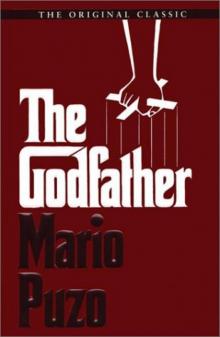 The Godfather
The Godfather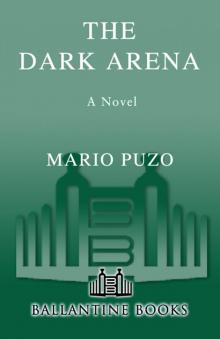 The Dark Arena
The Dark Arena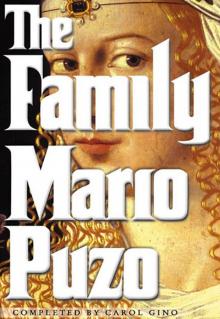 The Family
The Family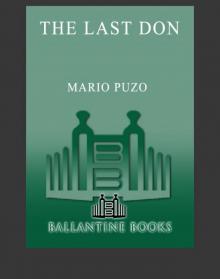 Last Don
Last Don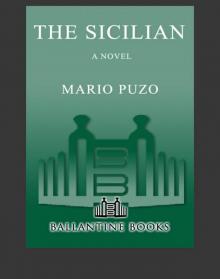 The Sicilian
The Sicilian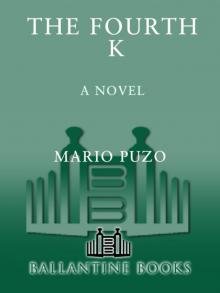 The Fourth K
The Fourth K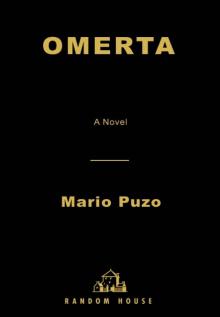 Omerta
Omerta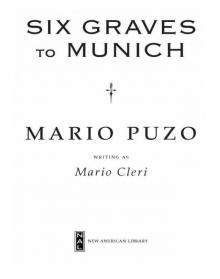 Six Graves to Munich
Six Graves to Munich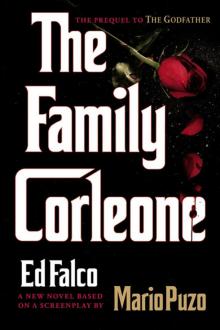 The Family Corleone
The Family Corleone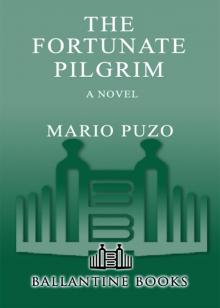 The Fortunate Pilgrim
The Fortunate Pilgrim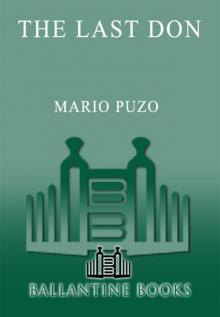 The Last Don
The Last Don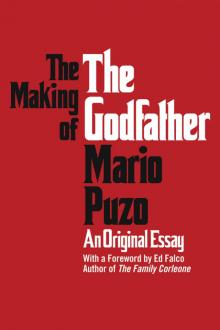 The Making of the Godfather
The Making of the Godfather Fools die
Fools die The Sicilian (v2.0)
The Sicilian (v2.0)